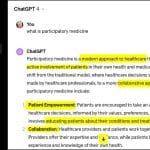Information Silo: An information silo is a management system incapable of reciprocal operation with other, related management systems… “Information silo” is a pejorative expression that is useful for describing the absence of operational reciprocity. Derived variants are “silo thinking”, “silo vision”, and “silo mentality”. (from Wikipedia)
Although much has been written about them, information silos are becoming far more recognized as the major reason why organizations are unable to take full advantage of the Internet’s power to interconnect business processes.
One of the great presentations at the Connected Health Symposium was “Illness in the Age of “e”: A Case Study in Participatory e-Medicine”, a conversation between e-Patient Dave deBronkart and his PCP, Danny Sands, M.D., MPH, who shares his time between a general internist practice at Beth Israel Deaconess Medical Center (one of the Harvard teaching hospitals), and serving as the Senior Medical Informatics Director at Cisco Systems. Danny is also an early proponent of patient empowerment and one of the authors of the e-Patients White Paper.
During their presentation, e-patient Dave spoke of coming to the visit with an agenda and Danny later confirmed that this kind of encounter is not standardized. In fact, the preparation for their clinical encounter was totally on the fly and didn’t have any specific methodology to rely upon. But e-patient Dave had an entire series of questions that were answered. As he told me later:
IMO, 30-70% of it is to empower the patient to know s/he’s able to set the agenda and needs to bring all the issues to the doc’s attention.
At the same time, Danny Sands liked the preparation documents because it helped him:
I encourage patients to do this because we need to negotiate an agenda. The reason for this is because I always have an agenda in mind, and the patient does, too. We only have a limited amount of time, so can we fit it all in, or else what can we give up? It’s not going to be perfect but pre-negotiating this agenda is the best way to make everyone somewhat happy.
Great idea! It is, in fact, such a great idea that within MGH (another Harvard teaching hospital), there is an entity that is conducting trials on the validity and usability of Visit Prep Documentation! Obviously that entity hasn’t communicated with all the other departments at MGH and its work product remains unknown to most. Trying to find a link to the website of “The John D. Stoeckle Center for Primary Care Innovation” from the MGH site is impossible. No trace of the center on the MGH list of departments & programs! But wait, and read the following, all taken from the Center’s page on Pre-visit preparation packets:
PRE-VISIT PREPARATION PACKETS
Patients who are better prepared for an appointment with their doctor will make better use of their one-on-one time with the doctor. The Stoeckle Center is developing novel approaches to reach out to patients and their families prior to their appointment. Newly designed pre-visit packets will contain basic information specific to each patient’s upcoming appointment, ensuring:
- a better prepared and better educated patient who becomes an active participant in his or her own treatment and prevention plans;
- the patient and physician identify clear objectives for the appointment;
- the groundwork is laid for true shared decision-makingthat patients understand their medications;
- better use of the time that patients and physicians spend together to make informed decisions and plans for care;
- patients have a clear understanding of how to follow their treatment plans;
- standardized clinician-approved patient education materials are provided;
- increased referrals to the MGH Blum Patient & Family Learning Center (as appropriate); and,
- improved clinician and patient satisfaction with the office visit;
The Center is currently testing its pilot pre-visit packets, which focus on the annual physical for 50 year-old men and women and well child visits in pediatrics. Tests are being conducted through individual patient interviews – obtaining feedback from patients on the format, content and length of the packets, as well as patients’ preferences for timing and method for receiving the packets. The Center is exploring systems that could link the information to the patients’ electronic medical records, making transmission of the information and record-keeping easier and more efficient.
The pre-visit packets are designed to encourage patients to become active participants in their own health care and to leave room in the office visit for discussions that can only happen in person. Patients who become accustomed to receiving information about straightforward health issues and partnering with their physician in information-sharing will be better prepared to make informed decisions should they ever face a more serious or uncertain health care decision.
Wow! And that is just the beginning of the treasure trove you can find on the site. Just have a look on the work done on “Prescribing Health Information“.
Information silos are responsible for some of the lack of knowledge transfer in the healthcare system. They are highly symbolic of the lack of transparency that plagues the entire system and that put a break on the efforts to improve the quality of care. In this particular case, the fact that there is no link from the MGH homepage to the Center’s information demonstrate how little impact the center has had on making the internet presence of this great medical institution more patient-centered.






Gilles, I agree that Danny & Dave’s presentation was one of the best I saw at Connected Health. I hope the video is posted soon so more people can see it.
But I have to disagree that the absence of a link on the MGH homepage is a sign of low impact by the Stoeckle Center. I’ve been in (or heard about) too many website design discussions to think that an organization’s identity is completely reflected in the links from a homepage.
Susannah,
if you don’t know OF the Stoeckle Center there is almost no chance you’ll find their website. It is truly a shame, since they do such wonderful work. It is as though the MGH administration has done whatever is possible to hide their work.
Many patients would benefit from reading their publications. This is one of the places that will help create a growing number of healthroots (portmanteau of healthcare and grassroots), willing to get actively engaged to promote healthcare reform. It’s higher internet/public visibility should be a priority, IMVHO.
Susannah and Gilles,
I agree with you both. It is a shame if people cannot find these materials and as a communication and new media scholar I find it hard to buy the argument about web design and maybe it was an oversight etc…. The silence/absence/loss is telling to me…strangely enough, in this web 2.0 world, we do have other ways of moving this information faster and further than before, which makes me wonder why it is not in other places as well…..